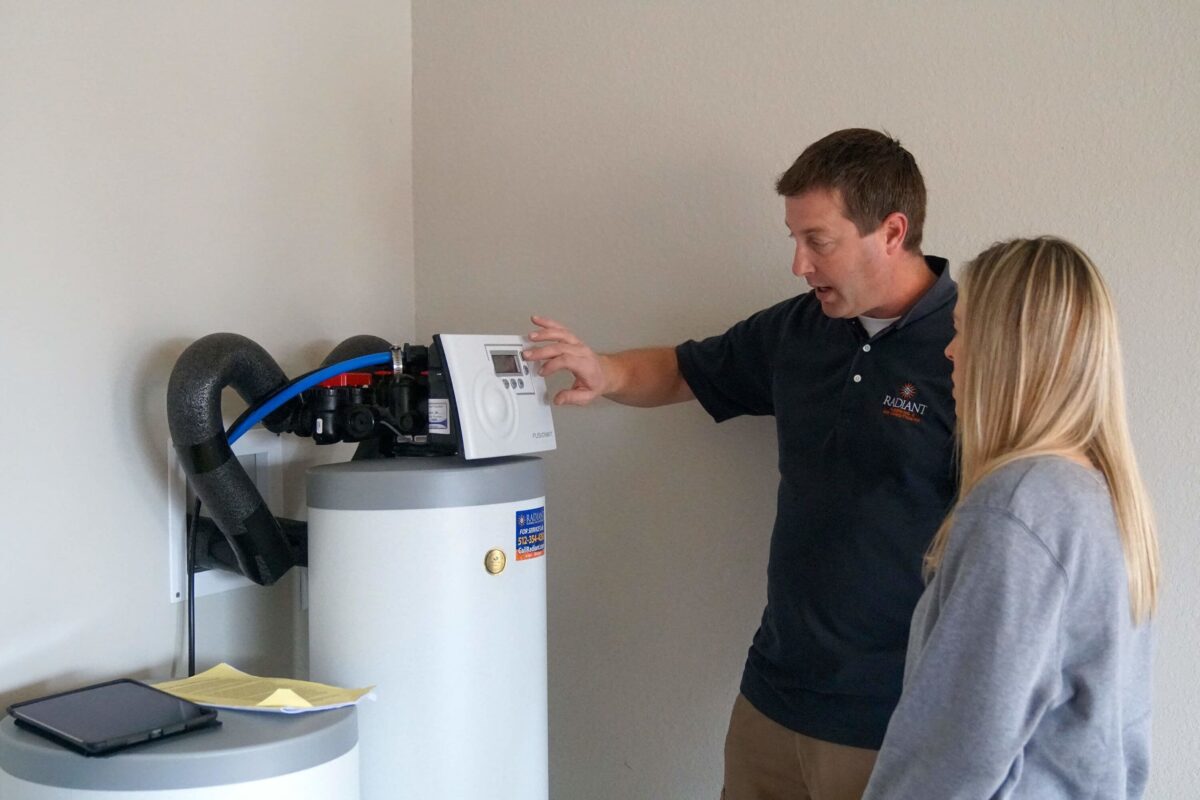Water naturally comes with a variety of minerals, such as calcium, magnesium, potassium, and sodium. The amount of these minerals in your water supply determines whether the water you get is hard or soft.
When water has high levels of minerals, it is hard. Conversely, soft water has a low concentration of minerals, particularly calcium, and magnesium.
Having extremely hard water in your home comes with many disadvantages. Some of them can cost you a lot of money in the long run. So, if you find that your water is hard, you should get a softener. In this article, we will review the Springwell Futuresoft Water Softener and what it can do for you.
Review Overview
| Features | Review |
|---|---|
| How It Works | It uses resin beads to crystallize hard water minerals, keeping them from sticking together to form scales. |
| Water Softening Efficiency | It does not soften water. For the most part, it prevents scale buildup. So, your water will remain hard. |
| Number of Models | 3 – FS1, FS4, and FS+ |
| Flow Rates in GPM | FS1 – 12 GPM FS4 – 15 GPM FS+ - 20 GPM |
| Standout Feature | ActiveFlo Technology – it makes flow rate variation smooth. |
| Water Purification | It does not purify water. However, you can get the UV purification add-on. |
| Installation | Installation is straightforward, thanks to the provided installation guide. |
| Warranty | Lifetime warranty on tanks and valves, subject to the company’s terms and conditions. |
| Shipping Cost | Shipping comes at no extra cost for orders above $29. |
How Does The Springwell Futuresoft Water Softener Work?
As its name already suggests, the Springwell softener does not use a salt-based softening system. In other words, it doesn’t soften water by ion exchange. Instead, the Springwell Futuresoft Salt-Free Water Softener neutralizes the hardness using a unique template-assisted crystallization technology.
Template-assisted crystallization (TAC) technology does not eliminate minerals causing hardness. Instead, it converts them into crystals. In crystal form, magnesium, and calcium ions cannot stick together to form scales. As a result, your water system will not suffer the typical consequences of scale buildup.
Template-assisted crystallization technology uses resin beads to crystallize hard water minerals. As the minerals move toward the surface of the resin beads, they come together to form non-sticky microcrystals. These crystals then break free from the resin beads and remain in the water without forming scales.
One upside of softening or conditioning water with the Springwell Salt-Free Water Softener is the low maintenance. You won’t have to replenish or refill water softener salt at any time. The only form of maintenance you would have to do is replace the sediment filter and probably replenish the resin beads. Luckily, this may only happen every 6 to 12 months – pretty fair compared to refilling softener salt every month.
Another advantage of this water-softening technique is that it does not waste water. Besides that, you save money since you will not spend on softener salt and electric bills.
Other Features
Futuresoft Water Softener is available in 3 models based on flow rate and size: FS1, FS4, and FS+. Each of these models is listed based on the estimated number of bathrooms for which they will be suited. So, as a customer, you do not need some deep technical knowledge to make a choice.
The FS1 should work fine in most small houses (1-3 bathrooms). Even if the kitchen faucets and bathroom shower were to run at the same time, you are unlikely to experience a drop in performance.
For medium to large houses, the FS4 is more suitable. Its flow rate of 15 GPM offers more room for multiple water outlets to run concurrently. For bigger houses with high water usage, the FS+ (7+ bathrooms) should be the go-to model.
The number of bathrooms for each model is estimated based on the average flow rate of water through a shower. If you suspect your shower’s flow is higher than average, you should consider a model with a higher flow rate (GPM).
Springwell Futuresoft vs. Similar Products
One feature Springwell Futuresoft has over some other water softeners is its ActiveFlo Technology. This technology allows it to maintain its effectiveness at water softening even when there’s a significant change in flow rate.
That aside, the flow rates of the Futuresoft models fall within the same range (12 – 20 GPM) as top water softeners. It is also durable; it should remain in top condition for up to 5 years. Not many water conditioners last that long without showing a significant drop in effectiveness.
Pros
- Very Durable: The Springwell Salt-free softener is durable thanks to the crystallization technology used to soften water. The media that softens the water remains in great shape.
- Environment-friendly due to salt-free technology
- Brilliant Sizing Format: Many other softeners come in sizes based on how many minerals are in the water. The Springwell salt-free softener comes in different sizes, depending on the number of bathrooms or size of the house.
- Easy Installation: The Springwell salt-free water softener is easy to install as it does not need a drain to do its job. The softener also comes with a comprehensive and easy-to-understand instruction manual.
- Easy Maintenance & Budget-friendly: Thanks to the crystallization technique, this softener does not need any maintenance as there is no ion or debris accumulation. The sediment filter needs to be changed routinely, though.
- Suitable for various settings: while the Springwell Futuresoft salt-free softener is mainly designed for city water, it can also be used on private wells. Use with a private well will require coupling the softener with a filtration system as minerals like iron and copper can damage the softener.
- Impressive Flow Rate: At a flow rate of 12-20 gallons per minute, this softener has a great flow rate nearly 3 times the average of many other water softeners.
- Great Capacity: there is no limit on how much hard water this softener can work on.
- Essential minerals are retained: because the minerals causing hardness are not being removed, your water still has the essential minerals that are good for your health.
- Salt-free technology is great for low-sodium diets
- No unnecessary pressure drops: You can use the softener across various inlets without risking pressure drops.
Cons
- There is no indicator on the sediment pre-filter: You can’t tell when the pre-filter needs to be changed.
- Does not produce soft water as hard minerals are not eliminated.
Do You Need To Soften Your Water?
If your water’s hardness exceeds the standard of 7 grains per gallon or 100 mg/l, it is advisable to get a water softener. Otherwise, softening your water is a personal decision that could have numerous benefits for you, your home, and the environment.
The advantages of softening your water include the following:
- Avoid the risk of mineral build-up or scales on the inside of water pipes, kettles, pots, and hot water heaters.
- Prevent the settling and appearance of mineral residue on glassware.
- Get rid of any odd taste in your water
- Benefits for healthier and stronger skin and hair
- Cleaner clothes that last longer
- Lengthen the lifespan of appliances and pipes



